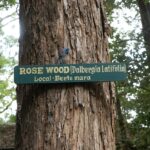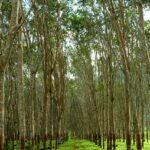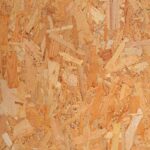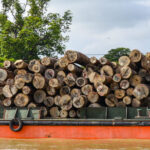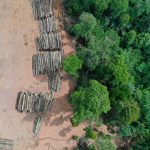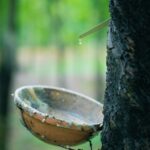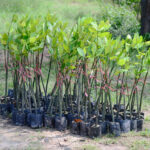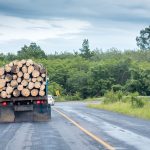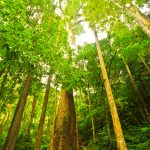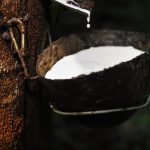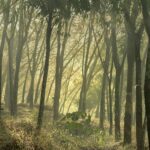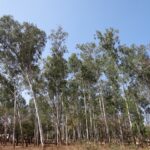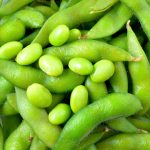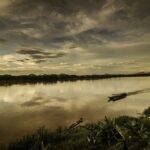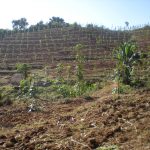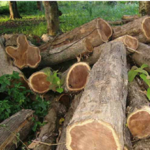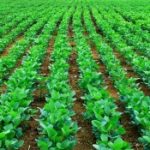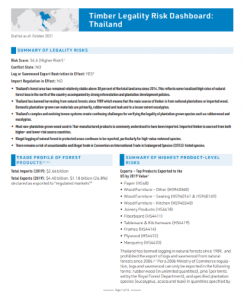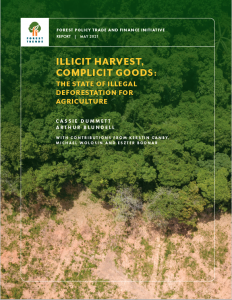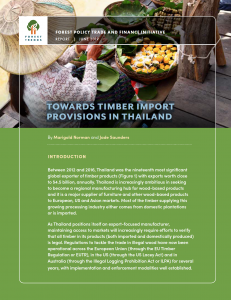
Thailand has banned harvesting from natural forests since 1989 and there are no natural forest concessions. This means that the main source of timber is either from national plantations or imports. Domestic plantation-grown raw materials primarily include rubberwood and to a lesser extent eucalyptus. Thailand’s highly complex and ever-changing tenure systems create continuing challenges related to the legality of some plantation species, particularly rubberwood and eucalyptus. As such, the main legality risks for timber sourced from Thailand surround the legal right to harvest, that are rooted in unclear land tenure, illegal land documents, and infringements of the laws in licensed plantations. Illegalities related to harvesting activities, such as harvesting without a permit, illegal logging of protected species and in protected areas, and illegal trade and transport (e.g. incorrect identification of species during transport) have been reported particularly for high value redwoods such as Siamese rosewood.
- Thailand’s forest area has remained relatively stable above 30 percent of the total land area since 2014. This reflects some localized high rates of natural forest loss in the north of the country accompanied by strong reforestation and plantation development policies.
- Thailand has banned harvesting from natural forests since 1989 which means that the main source of timber is from national plantations or imported wood. Domestic plantation-grown raw materials are primarily, rubberwood and teak and to a lesser extent eucalyptus.
- Thailand’s complex and evolving tenure systems create continuing challenges for verifying the legality of plantation grown species such as rubberwood and eucalyptus.
- Most non-plantation grown wood used in Thai-manufactured products is commonly understood to have been imported. Imported timber is sourced from both higher- and lower-risk source countries.
- Illegal logging of natural forest in protected areas continues to be reported, particularly for high-value redwood species.
- There remains a risk of unsustainable and illegal trade in Convention on International Trade in Endangered Species (CITES)-listed species.
Read more by downloading the Thailand Timber Legality Risk Dashboard here.
Cambodia once profited heavily from exploiting its natural resources, particularly through illegal logging and land concessions. Powerful elites—including tycoons, military officials, and local governors—benefited from this extractive economy, enriching themselves through the sale of timber and state land. However, the country’s forests have now been nearly depleted, with some of the world’s worst deforestation rates tied to state-backed illegal logging. Similarly, land concessions have been exhausted, with little public land left to sell and many long-term deals yielding minimal returns.
This collapse has undermined a key funding source for the Cambodian People’s Party’s patronage system. As traditional extractive resources have dried up, the regime has increasingly relied on more opaque and illicit activities. In particular, Chinese-run online scam operations have emerged as a lucrative alternative revenue stream. This shift highlights a broader trend: Cambodia’s criminal networks are now moving beyond resource exploitation and turning toward other forms of illicit enterprise.
Massive wood seizure triggers intensified hunt for illegal logging rings, The suspects implicated a former government official in ordering the concealment, and police also discovered firearms and woodworking tools at the scene.
Thailand’s Ministry of Agriculture and Cooperatives is set to officially launch a major national program on May 14 to issue “Tree Title Deeds” and “Rubber Tree Title Deeds,” providing farmers with legal recognition of trees as economic assets that can be used as collateral for loans.
The Rubber Authority of Thailand and the Agricultural Land Reform Office will jointly oversee the rollout, which includes a formal signing ceremony and a presentation on how farmers can register their trees, assess their value, and leverage them within the financial system. Officials say the program could generate wider economic benefits, including carbon credit trading, sustainable timber sales, and possible tax incentives, while supporting the national target of increasing forest cover to 40 percent of Thailand’s land area.
In recent developments, the Thai plywood industry has been scrutinized after Vietnam initiated an anti-dumping investigation into Thai Medium Density Fiberboard (MDF) and Particleboard on September 25, 2024. This was followed by South Korea launching a similar investigation on December 16, 2024. These actions have raised concerns among Thai exporters, prompting them to formally contest these allegations.
Vietnam has emerged as a crucial market for Thai MDF, with exports valued at $60.48 million in 2024. The accusations from Vietnam stem from a perception that Thailand’s competitive pricing is undermining local industries. Meanwhile, South Korea’s investigation appears to be influenced by environmental policy changes that have increased production costs for its local manufacturers.
Thailand and Bhutan officially signed a free trade agreement (FTA) on April 4, aimed at enhancing trade relations between the two countries.
Thailand’s major exports include automobiles and auto parts, wheat products, prepared foods, microwave ovens, beverages, and canned and processed fruit. Meanwhule, Bhutan’s major exports are vegetables, fruit, aircraft and aircraft parts, auto parts, timber, wood and wood products, and beverages such as mineral water, soft drinks, and liquor./.
The ITTO has released the 2025 scores for its Global Timber Index. The GTI s a survey in nine pilot countries that covers timber harvesting, trade, and manufacturing, including production, orders, imports and exports, employees, inventory, raw material prices, and other business indicators. A GTI index reading above 50 per cent indicates the industry prosperity is generally expanding, while below 50 per cent indicates that it is generally declining.
Other news in the report includes:
- Thailand’s Commerce Ministry announced the simplification of export procedures for the export of Thai wooden products. Except for Siamese Rosewood, which remains banned from export, companies are no longer required to obtain a permit to export these wooden products.
- On sustainable forest management, the report said Brazil’s National Biodiversity Commission established national biodiversity targets for the period 2025-2030, including a target of achieving zero deforestation in the country.
The global agarwood trade heavily depends on wild-harvested endangered tree species, despite international regulations for protection, with significant volumes going undocumented in official trade records, a new study reveals.
About 70% of the trade depend on Aquilaria filaria and Aquilaria malaccensis, both threatened species, sourced from the wild, raising major sustainability concerns. Meanwhile, there are some tree species that are not even covered by CITES, the global wildlife trade convention.
Due to discrepancies between CITES and customs data, along with weak enforcement and outdated regulations, researchers suggest the illegal trade is far larger than reported.
Researchers urge stronger monitoring, updated data, expanded species protection, and a shift to cultivated sources. They also call on consumers and wealthy importers to support conservation and governments to promote sustainable practices.
Japanese paper and packaging giant Oji Holdings and New Forests, a global investment manager focused on nature-based assets, announced on March 26 a US$300 million (S$401 million) fund to buy forestry estates, with the majority of the investment set to be in South-east Asia.
The fund is a reflection of increasing investor interest in forestry not only for stable returns from timber revenues but also for the climate, and increasingly biodiversity, benefits. Large timber concessions that have tracts of natural forest can also earn revenue from carbon credits by keeping the forests standing.
New Forests had nearly 912,000ha of certified forests under management globally in the 2024 financial year (July-June), with an additional 200,196ha of conservation areas, according to its latest sustainability report.
FSC and Assurance Services International (ASI) announce the launch of the Teak Corridor transaction verification (TV) loop. FSC and ASI have conducted TV loops on FSC-certified high-value timber species like teak (Tectona grandis) in the past. The previous teak TV loop, along with other available information, indicate the possibility of integrity risks in the segregation of FSC-certified and non-certified teak in the supply chains.
Therefore, FSC recommends certificate holders with teak in their certification scope to apply additional due diligence in selecting their teak suppliers and following FSC rules to ensure that the teak products they purchase are legitimate and within the FSC certificate scope of the seller.
In the volatile borders of Myanmar and Thailand, one name dominates in the corridors of power and the murky depths of illicit business: Saw Chit Thu. A master of defection and betrayal, he has navigated shifting alliances to build an empire in Myawaddy, controlling a network of economic and military interests that stretches across the borders.
This article tracese his evolution and control over Kawmoora and lucrative timber trade rights along the Moei River, particularly in Shwe Kokko village, which marked the beginning of his transformation from a guerrilla fighter to a power broker. Shwe Kokko, meanwhile, transformed from a timber and cattle trading hub to a casino town and scam centre, attracting Chinese investors relocating their operations from other regions.
The past decade has witnessed a deadly war between Thai authorities and Siamese rosewood poachers, resulting in numerous deaths and injuries on both sides.
Siamese rosewood (Dalbergia cochinchinensis, or “phayung” in Thai) is an ancient hardwood species found in the Mekong region spanning Thailand, Cambodia, Vietnam, and Laos. Illegal logging has cleared vast swathes of Siamese rosewood over recent decades, sparking predictions it could go extinct by 2026.
But after a huge conservation push, Thailand’s forests now host the largest remaining stocks of Siamese rosewood in this region.
The Thai Commerce Ministry last year issued a ban on the export of Siamese rosewood – whether in the form of logs, timber, pot plants, or wood products. Yet, the wood’s high value continues to drive poachers and traffickers to break the law, cutting the trees in Thai forests and smuggling them out of the country – often aided by corrupt Thai officials.
China became Thailand’s largest foreign investor in 2023, signaling the deepening economic ties between the two nations. This shift reflects not only China’s economic significance to Thailand but also Thailand’s strategic position in Asia as a key manufacturing and investment hub. In 2023, bilateral trade between the two countries reached US$126.3 billion, with China firmly established as Thailand’s largest trading partner and investor for the 11th consecutive year.
Rubber: Thailand is one of the largest producers of natural rubber, and China is a major market for Thai rubber used in manufacturing tires, automotive products, and other industrial good
Wood: Thailand exports a significant amount of wood, timber, and other forest products to China, which is used for furniture manufacturing and construction materials.
Paper and Pulp: China imports paper and paperboard products from Thailand for use in its manufacturing industries.
Three members of a forestry protection unit in Ban Kut Takab of Nakhon Phanom’s Waritchaphum district were attacked in a raid by five men. The gang stole Siam rosewood and two shotguns from the forestry officials who were bound and left with their heads covered. The stolen rosewood was originally seized by officials in 2011.
The Ivory Coast is steadily gaining on southeast Asian nations as a major rubber producer, buoyed by pending sustainability rules in Europe.
The West African country produced 1.55 million tonnes of natural rubber last year, according to the International Rubber Study Group. That is nearly double the 815,000 tonnes produced in 2019 and puts the Ivory Coast ahead of Vietnam in becoming the world’s third-largest producer, after Thailand and Indonesia.
Indonesia and Thailand currently produce about half the world’s natural rubber. But Indonesia, the world’s second-largest producer, saw output drop 20% from 2019 to 2.65 million tonnes last year. Unlike Ivory Coast, Indonesia is seeing a decline in the number of farmers producing natural rubber.
Mangrove restoration projects based on mass tree planting have often proved unsuccessful due to a focus on quantity rather than carefully selecting planting sites or prioritizing long-term social and ecological gains. Thailand’s state-led and corporate-funded restoration approaches have typically followed this unsustainable model, prompting critics to call for more ecological and community-based approaches that place more emphasis on natural regeneration.
Several new national initiatives aim to improve mangrove management in Thailand: A collaborative public-private program called the Thailand Mangrove Alliance aims to bring 30% of Thailand’s mangroves under effective management by 2030.
However, a new carbon credits initiative that aims to link coastal communities with corporate partners has drawn widespread skepticism from environmental groups, who warn the scheme could effectively transform public forests into corporate lands.
As Thailand inches forward on its decades-old vision for a “logistics corridor” connecting the Pacific and Indian oceans, local opposition and political instability threaten the plans. the proposed 90-km highway-rail link would cut across the Malay Peninsula, connecting a planned port facing the Indian Ocean in Ranong province with another port planned for the Chumphon province, along the Gulf of Thailand and with a lane to the Pacific Ocean. A special economic zone would be established nearby.
Thailand’s US $2 billion forest and forest products industries, both export and domestic, will benefit significantly from the new port. The bulk of domestic wood supply comes from plantation species such as teak and eucalyptus, but also wood derived as a by-product of agricultural processes, such as mango and durian wood. By far, the largest volume of this type of wood is rubber. Thailand is also a major timber importer from many countries, not only within the Asia-Pacific region but also from Africa, the EU and the Americas.
This is mainly processed into products that are exported again. The range of wood types and sources is broad and includes softwood from New Zealand and South America, high-quality species from Africa and the Pacific, and rubberwood and teak from Thailand’s neighbouring countries.
The investigation was part of a larger operation by the Central Investigation Bureau to crack down on cross-border environmental crimes, specifically illegal logging and timber trafficking, which has seen a surge in recent months.
Further investigations revealed that the timber was destined for export, hidden among handicraft products, to international markets. Siamese Rosewood and Padauk are highly sought after by foreign buyers, especially those who believe the woods are auspicious. Siamese Rosewood can fetch up to 1,500 baht per kilogram abroad, while Padauk sells for around 300 baht per kilogram. Knots of Padauk, considered rare, can sell for as much as 2,000 baht per kilogram. The seized timber was estimated to be worth over 10 million baht on the international market.
The authorities are continuing to investigate the case and aim to dismantle the international illegal timber smuggling network responsible for these activities. Further arrests are expected as the operation progresses.
Bangkok Produce Merchandising Public Company Limited and ERM-Siam Company Limited, a global sustainability consulting firm, hosted a workshop for farmers, feed-related industry organizations, government agencies, educational institutions, independent auditors, and both Thai and international NGOs to discuss inter alia issues of sustainability, certification, standards and traceability. Topics also included compliance with various international trade standards such as include the EU’s Carbon Border Adjustment Mechanism (EU-CBAM), EU Deforestation-free Products Regulation (EUDR), and EU Corporate Sustainability Due Due Diligence Directive.
This brief on Thailand’s rubber sector, with a focus on EUDR compliance. Thailand, as the world’s largest producer of natural rubber, generated over 4.7 million tonnes in 2022, accounting for nearly one-third of global rubber production. A significant 90% of this production is contributed by 1.68 million smallholders, cultivating rubber over 3.9 million hectares. This sector is crucial to Thailand’s economy and the livelihoods of rural households, with approximately 25% of agricultural households engaged in rubber production.
Key topics covered include:
- Mapping natural rubber production areas
- Registering smallholder rubber farmers
- Tracing natural rubber supply chains
- Building capacity within the sector
- Enhancing information-sharing practices
Global rubber producers are turning to forest certification to “EUDR-proof” supply chains – a massive undertaking given that 6 million “smallholders” are responsible for farming rubber trees worldwide.
However, without national standards and governments mandating compliance to these standards, producers stand little chance of “closing loops in global supply chains”, with just 1.8% of rubber cultivated in Thailand meeting FSC standards. As the world’s largest producer of natural rubber, Thailand supplied almost 40 per cent of global rubber stocks in 2021. Over 90% of rubber cultivation occurs in Indonesia, Vietnam and Thailand, with more than 70% of rubber produced supplied to the auto industries.
Just 1.8% of rubber cultivated in Thailand meeting FSC standards. a cooperative of 225 rubber smallholders managing more than 1000 hectares of rubber trees is using the Thai national standard to sell PEFC-certified latex rubber into global markets. The low levels of certification result from a disagreement between global buyers and sellers (the farmers) about the quantity and price of rubber products.
The Rubber Council of Thailand is pushing for a Thai government mandate that all rubber plantations (about 22 million Rai or 3.52 million hectares) meet Thailand’s standard for forest plantation management (TIS 14061).
As Thailand is a major producer of some of those commodities, local law compliance in the production of those commodities in Thailand constitutes an important part of the due diligence requirements under the Regulation, even though the Regulation itself is EU law. This newsletter highlights some of the potentially-relevant laws and regulations in Thailand for the operators and traders who have supply chains in the country.
Over three million tons of West African Rosewood have been shipped to China since 2017. The logs are manufactured into high-end Chinese furniture and exported worldwide as part of a multi-billion dollar furniture industry.
In November, Wood Central reported that CITES had banned the felling, transportation, and exportation of West African Rosewood in response to Chinese traders’ “industrial-scale” exploitation of the timbers. That move, according to environmental watchdog forest-trends, is an acknowledgment that past measures to protect the species, known as P. erinaceus, have “not worked and that CITES Parties (who are responsible for the measures to verify the legality and sustainability of trade, have not been able to eradicate illegal trade alone.”
Now, a new report by the Environmental Investigation Agency alleges that the multi-billion dollar trade is showing no signs of slowing, despite CITES and the Gambian government’s both introducing outright bans on the harvest and distribution of the timbers.
One of the world’s largest paper companies, Thai-based Double A, is now PEFC-certified for chain-of-custody.
Double A produces 600,000 tons of paper from its mills in Thailand and France. As part of an agroforestry project known as KHAN-NA, Double A is now working with 1.5 million Thai landowners to grow 200 million eucalyptus trees around the edges of rice fields.
New research using Trase data shows that supply chain divergence to meet different consumer requirements already is a reality. Brazil’s exporters, for example, sell soy to Denmark and Norway that is four-times less exposed to deforestation than soy sent to China or used domestically.
The researchers interviewed companies from the Brazilian soy sector and confirmed such segmentation is both predictable and standard practice. While physical segregation of soy grains can be challenging, it has not been difficult for certain traders and regions exposed to very different levels of deforestation to specialise in markets that demand higher or lower levels of sustainability.
CP Foods subsidiary, Bangkok Produce Merchandising (BKP), and Louis Dreyfus Company (LDC) have formalized a collaboration aimed at leveraging satellite mapping solutions and traceability data points to create sustainable and deforestation-free supply chains, specifically focusing on soy products.
Overview of Thailand’s exposure to the EU Deforestation Regulation (EUDR) with summaries of the structure and challenges for particular sectors such as rubber, oil palm and timber.
Mongabay presents a short summary of status of illegal logging and forest governance in SE Asia.
Malaysia and Indonesia want to bring other Southeast Asian countries on their side amid ongoing disputes with the European Union over environmental and deforestation regulations that are set to take effect in late 2024, with the two nations worried about the regulations’ impact on the region’s agriculture exports. Both Southeast Asian states have independently initiated complaints against the EU to the World Trade Organization (WTO).
Indonesia and Malaysia, which together account for around 85% of global palm oil production, argue that the EU Deforestation-Free Regulation is discriminatory and unfairly punishes small-scale farmers who will struggle to cope with the bureaucratic demands set by Brussels.
An unsanctioned logging operation, hidden deep within Thailand’s Bang Khanun protected forest, was inadvertently exposed during a routine inspection by officers from the Department of Special Investigation (DSI).
Panatchakorn Potibandit, director of the preventive and suppression strategy unit at the Forest Protection and Fire Control Office, revealed that a team of specialised rangers carried out the warehouse raid to arrest the timber thieves. Their search unveiled a cache of 30 Narra logs, with nine of them traced back to the forest reserve of Phu Soi Dao National Park in Uttaradit province. Alongside the Narra logs, officials also uncovered 50 pieces of Burmese rosewood timber, 51 Burmese rosewood logs, and 59 more Narra timbers.
It is believed that these valuable illicit wood resources, collectively worth 33 million baht, were the ill-gotten gains of a timber thieves gang. Their cunning strategy involved hoarding the wood in the warehouse before attempting to smuggle it to neighbouring countries.
Myanmar’s military junta has used foreigners including Thais as human shields in northeastern Shan State, where fighting the junta and an ethnic alliance is escalating, according to The Irrawaddy online.
Apart from Thais, other foreign nationals were those from Nepal, Ethiopia and Laos. “The army is using them as forced labor to build bunkers, dig trenches, and carry timber. They are practically human shields.”
European Union rules aimed at stopping deforestation threaten widespread disruption for Southeast Asia’s rubber sector, from Cambodia’s 30,000 small farmers to major exporters in Thailand and Malaysia.
The concern for Southeast Asia, critics say, is that these requirements will disproportionately hurt small farmers while failing to adequately address rubber’s role in deforestation.
The report by the Financial Accountability and Corporate Transparency (FACT) Coalition, published on Oct. 26, said that “critical gaps” in the U.S. anti-money laundering system are vulnerable to exploitation by criminal groups, including those behind the destruction of the Amazon, the world’s largest tropical rainforest.
FACT’s analysis focuses on forestry crimes and illegal mining in Peru and Colombia. The report also summarizes how U.S. importers sidestep the law by not trading directly with the blacklisted Myanmar Timber Enterprise (MTE) but instead with non-sanctioned Myanmar exporters and middlemen based in Singapore, Thailand and other third countries.
The deforestation caused by the rubber farming in Thailand and the world has been significantly underestimated, according to new findings from two scientific studies, with Southeast Asian rubber production potentially contributing up to three times more forest depletion than previously thought.
With over 4 million hectares of forest lost for rubber production since 1993, an area the size of Switzerland, “the effects of rubber on biodiversity and ecosystem services in Southeast Asia could be extensive,” according to a paper published on Wednesday in the journal Nature.
In Southeast Asia, mature rubber plantations covered 14.2 million hectares. Indonesia, Thailand, and Vietnam accounted for more than 70% of these plantations.
China, Malaysia, Myanmar, Cambodia, and Laos were also important rubber-producing countries. Rubber plantations that were closed down before 2021 were excluded from the analysis, despite the fact that they may have contributed to deforestation.
A new report indicates that rubber-related forest loss has been substantially underestimated in policy, by the public and in recent reports. Direct remotely sensed observations show that deforestation for rubber is at least twofold to threefold higher than suggested by figures now widely used for setting policy
The Royal Forest Department (RFD) and Food and Agriculture Organization (FAO) have formally launched eTree, a digital platform designed to support growers register the trees they are growing to sell as timber.
The eTree platform is intended specifically for people who are interested in growing trees for sale but are unable to register the land they intend to grow them on commercially as a “forest plantation” under the Forest Plantation Act.
While this article is a basic summary of recent reports on the trade of Myanmar teak and sanctions, it also lists a few countries where some FSC-certified or “ethical teak” can be found (Indonesia, Vietnam, Laos, Costa Rica, Brazil, Columbia)
Thailand, Laos and Myanmar are at the frontlines of illicit trade in Asia dominated by transnational organized crime syndicates.
The trafficking in illegal narcotics, precursor chemicals, timber and wildlife, people and illicit goods across Southeast Asia is being tackled thanks to the support of the specialized UN agency focusing on drugs and crime.
While Thailand no longer has extensive natural forests left, illegal logging still occurs. This media outlet reports recent enforcement efforts, including the police arrest of a forest ranger and four of his friends for illegal logging in Khon Kaen province in northeast Thailand. The gang cut down protected and valuable species such as Siamese rosewood and Burmese padauk.
Barclays has published new supply chain sustainability requirements for clients in forest-risk commodity sectors including beef and palm oil.
Barclay’s has added a new Forestry and Agricultural Commodities statement to its website this week. The statement stipulates that Barclays has “no appetite” to support companies directly involved in illegal forest clearance.
From the beginning of July, beef producers will not be able to undertake work in areas of the Amazon rainforest cleared or converted after 2008.
Those producing beef in South America will also need to prove that they gave deforestation-free supply chains by 2025. By the end of 2025, these firms will need to update their policy commitments on deforestation and human rights, and to monitor and report on deforestation-free product volumes.
An investigation has been ordered into the source of money paid into the bank accounts of a female official of the Forest Department, who is alleged to be connected with a large quantity of illegal Burma Padauk (Pterucarpus macrocarpus) lumber, found at a sawmill in Doi Saket district in Chiang Mai.
*** Of particular interest is the mention of the use of technology such as mini transmitters embedded in the Burma Padauk trees.
The Department of National Parks, Wildlife, and Plant Conservation is seeking police assistance to locate the mastermind behind an illegal timber case in the North. Yesterday, forest officials seized 401…
Click here to access the Global Illegal Logging and Associated Trade (ILAT) Risk assessment tool and to download the Forest Trends User Guide describing the functionality of the ILAT Risk Data Tool.
Click here to access the Cattle Data Tool.


